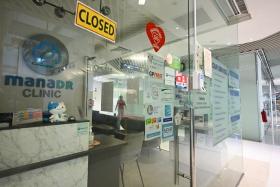Enhancing the lives of PWDs with infocomm and assistive technology
People with disabilities will have more access to infocomm, assistive tech tools
Ms Sebrina Ng a second-year student at Temasek Polytechnic (TP), had to ask her classmates to repeat or clarify things her teacher said in class, to her frustration and embarrassment.
Ms Ng, 22, who is deaf, struggled to understand what was being said in class even with a hearing aid. She often had to resort to lip reading, which she said was accurate only about half the time.
She said: "It was stifling, and I felt stressed out when I could not hear or catch up with what the teacher was saying."
This went on throughout the first year of her poly life, until she got help in the form of the Roger Pen, a device that helps channel speech directly into the hearing aids of its user.
But future TP students might not have to face those struggles, with its new Assistive Technology Library.
In his opening speech at the E2Connect Forum 2018 yesterday, Minister for Communications and Information S. Iswaran announced the launch of three assistive technology libraries, which will allow people with disabilities (PWDs) to have more access to infocomm and assistive technology tools.
The satellite loan libraries, in addition to the loan library at charity SPD, allow students with special needs to browse, use and borrow a range of devices, including a Braille notetaker and screen readers.
They can even borrow a special jacket that replicates a hug, which can help students calm down.
Mr Iswaran said: "These libraries will give PWDs greater access to infocomm and assistive technology devices, so they can determine the suitability of these devices for their needs, before making the financial commitment to purchase one.
"We want to invite more Institutes of Higher Learning to join this effort, to set up similar satellite libraries to benefit their students and others."
Another TP student, Mr Rayner Teo, 18, who suffers from vision impairment, said he has felt disadvantaged compared with his peers.
He said: "I felt like I lose out to others, because I could not see the whiteboard clearly."
The first-year business student said his vision began deteriorating at 10 years old and he struggled to adapt.
When he needed to, Mr Teo would ask his classmates for help, but it made him feel embarrassed and he did not want to distract his peers.
Besides TP, other institutes of higher learning will also soon be equipped with such tools, including Ngee Ann Poly and Singapore Poly.
Mr Samuel Wee, director for student support and career services at TP, said the tools will help students become more independent and confident.
He added that TP wanted to have the new Assistive Technology Library in a prominent place in the main library.
"We want to tell students with special needs that they don't have to be parked in a secluded corner," he said.
"We want to normalise their condition and make the space inclusive."
Mr Danial Asri, 18, a second-year biotechnology student who has Asperger's syndrome, said one of his biggest struggles is relating to his peers.
He told The New Paper that he thinks having the library so prominently and publicly placed could help other students recognise that there were students with special needs around them and this could help them to relate to each other better.
Get The New Paper on your phone with the free TNP app. Download from the Apple App Store or Google Play Store now



